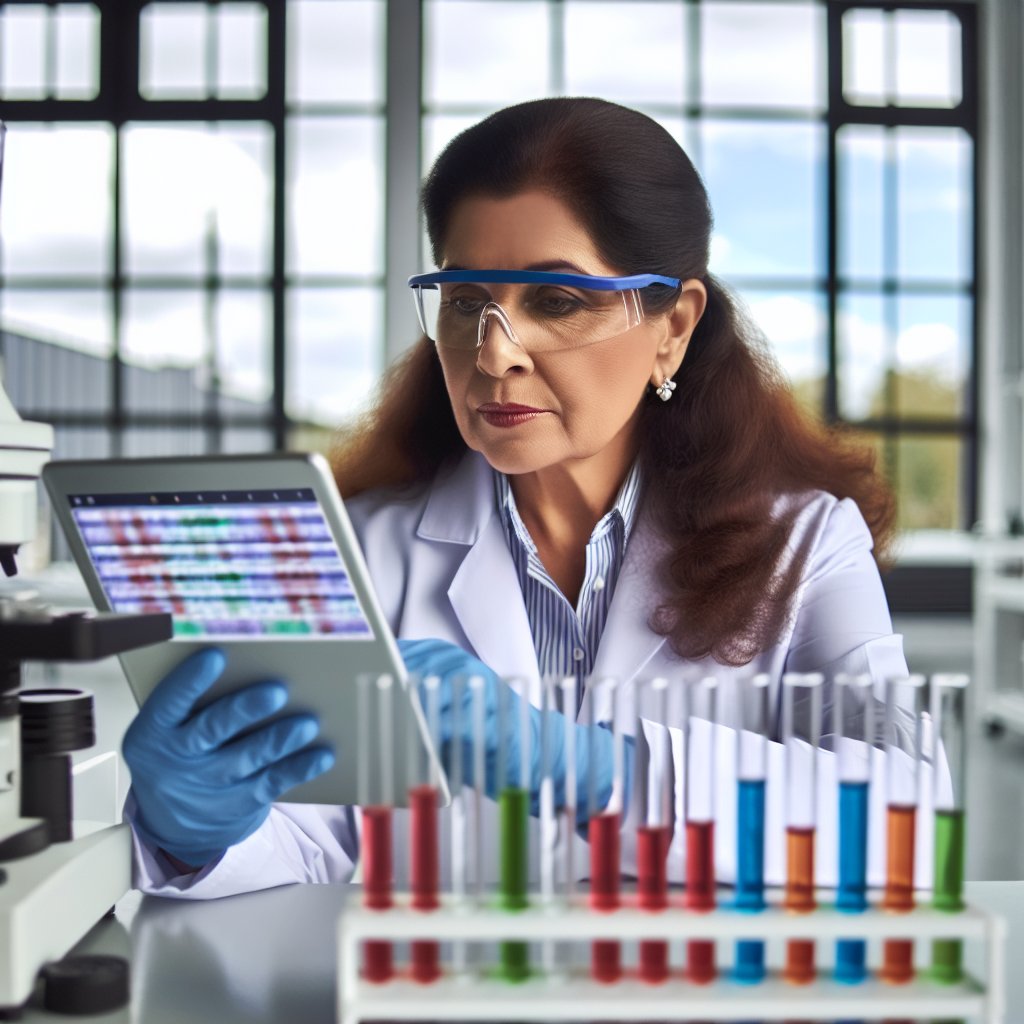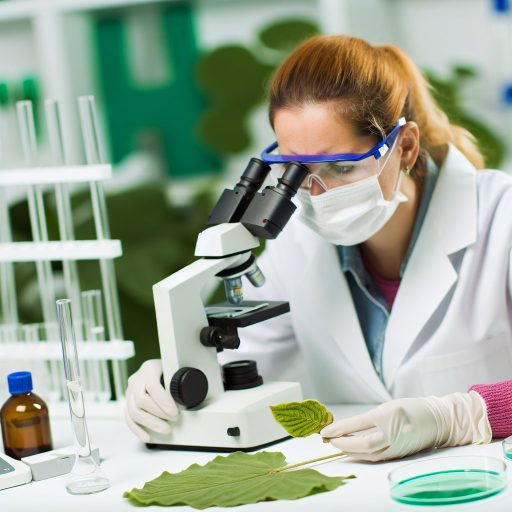Introduction
Food science explores the complex interactions between food components and the human body.
Genetically modified foods, or GMOs, have been a controversial topic in recent years.
Brief overview of food science and genetically modified foods
Food science delves into the chemical, biological, and physical makeup of food.
It also examines the interaction between food and the human body.
Genetically modified foods are products derived from organisms.
These organisms have had specific changes introduced into their DNA using genetic engineering techniques.
Importance of understanding the safety of genetically modified foods
It is crucial to assess the safety of genetically modified foods to ensure consumer health and well-being.
Understanding the potential risks and benefits of GMOs can help us make informed decisions about their consumption.
Definition of genetically modified foods
Genetically modified foods, also known as GMOs, are foods that have been altered at the genetic level in a laboratory.
Explanation of how they are developed
Genetically modified foods are developed by inserting genes from one organism into the DNA of another, creating new combinations of genes.
This process allows scientists to introduce desirable traits into crops, such as resistance to pests, harsh weather conditions, or herbicides.
Common genetically modified crops
There are several genetically modified crops that are commonly grown and consumed around the world. Some of the most prevalent include:
- Corn: Around 92% of the corn grown in the US is genetically modified to resist pests and herbicides.
- Soybeans: Approximately 94% of soybeans grown in the US are genetically modified to resist herbicides.
- Cotton: More than 90% of cotton grown worldwide is genetically modified to resist pests.
- Canola: Over 90% of canola crops in the US are genetically modified to resist pests and herbicides.
In addition to these common crops, genetically modified potatoes, papaya, squash, and apples are also available in the market.
While there is ongoing debate about the safety and impact of genetically modified foods on human health and the environment, they have become an integral part of the global food supply chain.
Benefits of Genetically Modified Foods
Genetically modified foods have been a topic of debate for many years.
However, there are several benefits that cannot be overlooked.
These benefits include:
Increased Crop Yield
One of the significant advantages of genetically modified foods is the ability to increase crop yields.
Through genetic modifications, crops can produce higher yields.
This can help in feeding the growing world population.
Transform Your Career Today
Unlock a personalized career strategy that drives real results. Get tailored advice and a roadmap designed just for you.
Start NowEnhanced Nutritional Value
Genetically modified foods can also be engineered to have enhanced nutritional value.
This means that they can contain higher levels of essential nutrients.
Thus, making them more beneficial to our health.
Resistance to Pests and Diseases
Another benefit of genetically modified foods is their ability to resist pests and diseases.
By introducing specific genes, crops can be made resistant to insects and diseases.
This reduces the need for chemical pesticides.
Extended Shelf Life
Genetically modified foods can have an extended shelf life.
This can help in reducing food waste.
By improving the shelf life of fruits and vegetables, genetically modified foods can stay fresh for more extended periods.
This reduces spoilage.
Genetically modified foods offer various benefits.
These include increased crop yield, enhanced nutritional value, resistance to pests and diseases, and extended shelf life.
While there are concerns about their safety, these benefits cannot be ignored.
They play a vital role in addressing global food security and nutrition challenges.
Gain More Insights: The Viticulturist’s Role in Wine Production
Genetically modified foods, also known as GM foods, have sparked debates worldwide due to concerns about their safety, potential health risks, environmental impacts, and ethical considerations.
Concerns about the Safety of Genetically Modified Foods
Potential health risks are a primary concern regarding GM foods. Some studies suggest that GMOs could trigger allergic reactions in sensitive individuals.
Moreover, there are concerns about antibiotic resistance genes transferring from GM crops to bacteria in the digestive system.
Long-term effects of consuming GMOs on human health are not yet fully understood.
Environmental impacts associated with GMOs raise additional questions. Cross-contamination of non-GMO crops through pollen drift can affect biodiversity.
Transform Your Career Today
Unlock a personalized career strategy that drives real results. Get tailored advice and a roadmap designed just for you.
Start NowIncreased use of herbicides and pesticides on GM crops could harm beneficial insects and wildlife.
Furthermore, GM crops engineered for resistance to pests may lead to “superweeds” that are resistant to herbicides.
Ethical considerations also play a significant role in the GMO debate. Critics argue that GM technology benefits large corporations at the expense of small farmers.
Patents on GM seeds could restrict farmers’ access to traditional seeds and perpetuate dependency.
Lack of transparency and labeling requirements raise concerns about consumer choice and autonomy.
As the debate surrounding GMOs continues to evolve, it’s essential to consider these various perspectives.
Policymakers, scientists, farmers, and consumers must collaborate to ensure the safety and sustainability of our food supply.
Addressing the safety of genetically modified foods requires a multifaceted approach that considers scientific evidence, ethical considerations, and environmental impacts.
Ongoing research and open dialogue are crucial in navigating the complex landscape of food science and ensuring the well-being of both people and the planet.
Find Out More: Tools and Software for Agricultural Marketing
Regulatory Bodies Overseeing Genetically Modified Foods
FDA (Food and Drug Administration)
The FDA is responsible for regulating and ensuring the safety of foods, including genetically modified organisms.
They evaluate the safety of GMOs by reviewing data provided by companies seeking approval for their products.
- The FDA evaluates the potential allergenicity, toxicity, and nutritional content of GMOs.
- They also assess the environmental impact of genetically modified crops.
- Once the FDA determines that a GMO is safe for consumption, it can be commercialized and sold to consumers.
USDA (United States Department of Agriculture)
The USDA regulates genetically modified crops to ensure they are safe for cultivation and consumption.
They oversee the planting, growing, and harvesting of GMO crops to prevent any potential risks to the environment and human health.
- The USDA conducts environmental assessments to evaluate the impact of GMO crops on ecosystems.
- They also monitor the distribution and trade of genetically modified seeds and crops.
- If a GMO crop poses a risk to the environment or human health, the USDA can restrict or prohibit its cultivation.
EPA (Environmental Protection Agency)
The EPA plays a role in regulating genetically modified crops that have been modified to produce pesticides or insecticides.
They evaluate the environmental risks associated with these crops to ensure they do not harm non-target organisms or ecosystems.
- The EPA assesses the toxicity of pesticides produced by GMO crops and their impact on beneficial insects.
- They also consider the potential for gene transfer from GMO crops to wild plant species.
- If a genetically modified crop poses a risk to the environment, the EPA can impose restrictions on its cultivation or use.
The regulatory bodies overseeing genetically modified foods work together to ensure that GMOs are safe for consumption.
They ensure that GMOs do not pose any risks to human health or the environment.
By evaluating the safety and environmental impact of GMOs, these agencies play a crucial role in safeguarding the food supply.
They are essential in protecting public health.
Transform Your Career Today
Unlock a personalized career strategy that drives real results. Get tailored advice and a roadmap designed just for you.
Start NowYou Might Also Like: Career Pathways for 4-H Youth Development Agents

Research on the safety of genetically modified foods
When it comes to the safety of genetically modified (GM) foods, researchers have conducted numerous studies to determine their impact on human health and the environment.
Studies supporting the safety of genetically modified foods
One of the most significant studies supporting the safety of GM foods was a meta-analysis published in the journal Critical Reviews in Food Science and Nutrition.
The researchers analyzed data from 1,783 scientific studies and concluded that GM crops are safe for human consumption and do not pose any health risks.
Furthermore, a review published in the Journal of Regulatory Toxicology and Pharmacology found that GM foods are as safe as their non-GM counterparts.
The study looked at a wide range of research on animals and humans and found no significant differences in health outcomes between those consuming GM and non-GM foods.
Criticisms and limitations of these studies
Despite the strong evidence supporting the safety of GM foods, critics have raised some concerns about the methodology and potential biases in these studies.
One of the main criticisms is that many of the studies supporting the safety of GM foods have been funded by the biotechnology industry, raising questions about their objectivity.
Additionally, some researchers argue that the long-term health effects of GM foods have not been adequately studied, and there may be unforeseen risks associated with their consumption.
Furthermore, there are concerns about the environmental impact of GM crops, such as the development of herbicide-resistant weeds and the potential harm to non-target species.
While research overwhelmingly supports the safety of GM foods, it is essential to continue monitoring their long-term effects on human health and the environment to ensure their safety in the future.
Delve into the Subject: Key Skills Needed for Conservation Scientists
Consumer Perception of Genetically Modified Foods
There is a widespread debate surrounding genetically modified foods (GMOs) and their safety for human consumption.
Consumer perception plays a crucial role in shaping the acceptance or rejection of GMOs in the market.
Several factors contribute to consumers’ attitudes towards GMOs, including:
- Trust in regulatory agencies and government
- Concerns about health risks associated with GMOs
- Environmental impact of GMO cultivation
- Perceived benefits of GMOs, such as increased crop yield
Labeling laws for GMOs vary by country, with some nations requiring mandatory labeling of GMO products, while others do not.
The lack of transparency in food production, especially regarding GMO ingredients, can lead to consumer distrust and reluctance to purchase such products.
Public opinion on GMOs is divided, with some individuals expressing support for the technology’s potential to address global food security challenges.
Others are concerned about the long-term effects of GMO consumption on human health and the environment.
Consumer perception of genetically modified foods is influenced by various factors, including trust in regulatory agencies, concerns about health risks, labeling laws, and public opinion.
Transform Your Career Today
Unlock a personalized career strategy that drives real results. Get tailored advice and a roadmap designed just for you.
Start NowIt is essential for stakeholders in the food industry to address these concerns and provide transparent information to consumers to promote trust and acceptance of GMOs in the market.
Safety of Genetically Modified Foods
The safety of genetically modified foods is a complex topic that requires further research and transparency.
GM foods can address global food security challenges by increasing crop yields and improving nutritional content.
However, concerns about long-term health effects and environmental impacts remain.
Continued research and monitoring are essential to ensure that GM foods are safe for consumption.
Clear labeling and regulation are important to allow consumers to make informed choices about the food they eat.
Transparency in the development and regulation of GM foods is crucial for building trust with consumers.
As consumers, it is vital to stay informed about GM foods and the latest research findings.
By educating ourselves, we can make educated decisions about the food we consume and support sustainable food systems.
Let’s call for more research, transparent communication, and responsible regulation to ensure the safety and sustainability of genetically modified foods.
Together, we can make a difference in shaping the future of food production and consumption.
Additional Resources
Genetically modified foods: What is and isn’t true – The Washington …
[E-Books for Sale]
The Big Book of 500 High-Paying Jobs in America: Unlock Your Earning Potential
$19.99 • 500 High-Paying Jobs • 330 pages
Explore 500 high-paying jobs in America and learn how to boost your career, earn more, and achieve success!
See All 500 High-Paying Jobs of this E-Book
1001 Professions Without a Degree: High-Paying American Jobs You Can Start Now
$19.99 • 1001 Professions Without a Degree • 174 pages
Discover 1001 high-paying jobs without a degree! Unlock career tips, skills, and success strategies for just $19.99!




